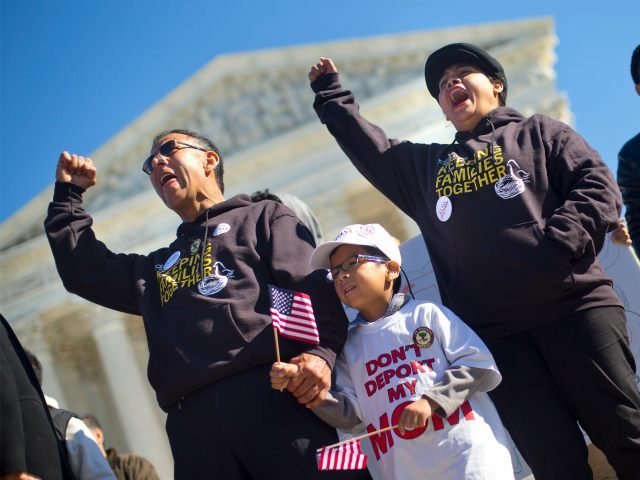Results 1 to 1 of 1
Thread Information
Users Browsing this Thread
There are currently 1 users browsing this thread. (0 members and 1 guests)
-
12-02-2015, 11:19 AM #1
Supreme Court Sets Stage for Epic Immigration Showdown Before Election
Supreme Court Sets Stage for Epic Immigration Showdown Before Election

AP Photo/Pablo Martinez Monsivais
by KEN KLUKOWSKI1 Dec 2015298
The U.S. Supreme Court will decide the fate of President Barack Obamaís executive amnesty for illegal aliens before the 2016 presidential election.
Twenty-six states have sued the federal government regarding DAPA, Obamaís federal regulation that indefinitely shelters 4.3 million illegal aliens from deportation and separately grants them work permits, authorizing them to obtain employment in the United States. Under this program, illegal aliens will also have access to entitlement programs such as Social Security, Medicaid, and Obamacare.
Updated from our previous report, the justices have denied in part Texas Solicitor General Scott Kellerís request for a 30-day extension of the deadline to file briefs opposing the Justice Departmentís petition for Supreme Court review (called a petition for a writ of certiorari). The justices have granted Texas only an extra eight days past the normal deadline.
As a consequence, the states must file a brief by December 29 explaining why the Supreme Court should not take this case at this time. U.S Solicitor General Donald Verrilli informed the Court that he would waive the federal governmentís right to file any reply to the states, so that the petition may be distributed immediately to the justices for consideration.
That means the justices will be able to vote at their Jan. 15, 2016, conference on whether to take the case. That will be the last date that new cases will be accepted for the Courtís 2015 term, which starts the first Monday of October and ends around the last week of the following June.
Absent extraordinary circumstances, any cases accepted for review after the mid-January cutoff start to fill the Courtís 2016 term, which will not begin until Oct. 3, 2016. There is no chance that a major case argued in October would be decided before the November 8, 2016 election. In fact, the case would likely not be decided until well after a new president is sworn in on Jan. 20, 2017.
The Supreme Court has decided not to punt the issue. On Jan. 15, 2016, the justices will vote on whether to set the case for argument. It only takes four votes out of nine to grant review of a case. Given that the U.S. solicitor general is asking them to do so in a case with very significant national implications, it is almost certain they will do so.
The case is United States v. Texas, No. 15-674.
http://www.breitbart.com/big-governm...down-election/
Similar Threads
-
Supreme Court Breaks Up A First Rate, Election Rigging Scheme
By Newmexican in forum Other Topics News and IssuesReplies: 0Last Post: 07-02-2013, 09:57 PM -
Mitch McConnell sets stage for immigration concession (with bogus Cornyn amendment)
By Motivated in forum illegal immigration News Stories & ReportsReplies: 3Last Post: 06-12-2013, 03:56 PM -
Showdown on Arizona immigration law goes to Supreme Court
By Jean in forum illegal immigration News Stories & ReportsReplies: 13Last Post: 04-24-2012, 03:57 PM -
Court rules against California Prop. 8, likely U.S. Supreme Court showdown
By HAPPY2BME in forum Other Topics News and IssuesReplies: 2Last Post: 02-08-2012, 08:53 PM


 LinkBack URL
LinkBack URL About LinkBacks
About LinkBacks




 Reply With Quote
Reply With Quote


Flyers Distributed by a Mexican NGO Instruct Illegal Aliens to...
04-16-2024, 09:43 AM in illegal immigration News Stories & Reports